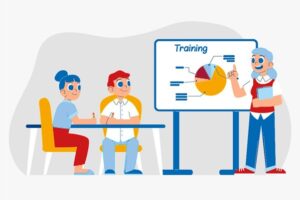
Source: Freepik
My name is Yasin Kalem and I am currently in the second year of my vocational training as a management assistant in dialogue marketing, or DiMa for short. When I first found out about the training program, I was very interested, but I didn’t know what to expect. I was worried that the training wouldn’t excite me and expected a strict routine. But my concerns were unfounded. To give you an idea of what’s behind the job description for the training program for management assistants in dialogue marketing, I’m taking you on a journey through my working routine as a trainee in this article.
From the Job Ad to the Training
“Self-organization, coordination, and documentation skills are just a few examples of the competencies acquired in practical training. Furthermore, you will have your own projects, develop marketing strategies, and enjoy interesting weeks where you can share your ideas. The apprentices will get to know the different departments of the IT Center and their individual tasks over their training period.”
That’s what the job description says. In concrete terms, this means that you get a framework and, thus, have some fixed components of the training. This includes IT support, where we support the services of the IT Center by phone, in person, and via e-mail. The good thing is that the rest of the training process is not strictly prescribed. A fixed daily routine and a consistent schedule are therefore not necessarily predetermined.
Getting to Know Yourself
Back then, it was important to me to do a vocational training in which I could constantly learn something new and expand my skills in the training fields. I wanted to try things out and get to know myself. That’s exactly what I found here, having started out with a basic interest in IT and with my communicative nature. I had my personal mentor, and I was given a foundation to build on independently.
The daily work routine we have varies from trainee to trainee – to a certain extent, all trainees have the opportunity to help shape their vocational training. In fact, numerous areas are covered as part of the training in the department Service & Communications of the IT Center:
- First-level support: initial processing of incoming inquiries (e-mail, telephone, chat) and coordination with specialist departments where necessary
- Personal customer contact: both technical and emotional support within the scope of first-level support
- IT administration: working with or in IT, for example, in relation to workstation equipment
- Marketing and event management: content creation for the IT Center blog and social media channels as well as event support
- Printing services: processing large-format print jobs for RWTH
- Staff scheduling: scheduling of shifts and staff
- And much more!
Through the many different tasks, you get to know yourself. On the one hand, this makes it possible to develop in a certain direction, but on the other hand, it also allows you to change direction or simply get a taste of other areas such as specialist departments.
Great Variety and Broad Knowledge
I find it all the nicer that the fixed components like IT support are even adaptable. Basically, incoming requests can be quickly solved through internal and external documentation sites as well as through others’ own experience and expertise. The wide variety of IT services offered and supported by the IT Center allows me to focus more intensively on the requests that particularly appeal to me.
This shows that it is not only what you know that is important, but also how you get the knowledge. However, if the “what” interests me a lot, I get the opportunity to develop further in it.
For example, I had the opportunity to learn about systems administration after proactively seeking it out. In addition, I agreed to write this blog post and I am currently looking into Microsoft 365 and communication infrastructures – purely out of interest. I also find it very exciting to apply what I learned in vocational school. For example, I was able to use communication psychology to determine how the way I talk affects the person across from me.
In addition to short-term tasks, I am also involved in other long-term tasks: These include the continuous optimization and refinement of public texts to ensure the best possible user experience. I’m also the trainee spokesperson for the department of Service & Communications, which means I act as an interface between the trainees and the trainers.
So not only have I found a good apprenticeship, but I can get to know and develop myself day by day.
Responsible for the content of this article is Yasin Kalem.




